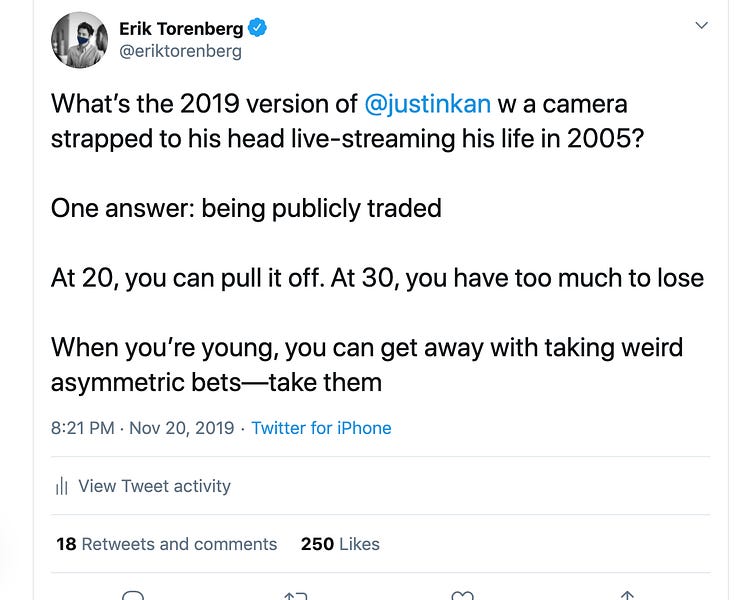Two Types of Risk
You’re not known for your losses, you’re known for your wins.

Capital Thinking • Issue #1141 • View online
I previously wrote about how starting a company is less risky than people think. This piece is a follow up to that piece as well as my piece on building personal moats.
To recap: remember, there’s two types of risks:
Job Risk: the chance your job will no longer exist
Career Risk: the chance your long-term career will be negatively affected
Founding a company might have job risk, but it often has little career risk. It’s an example of an asymmetric bet—a bet that, if it works, will have tremendous upside, and if it doesn’t, will still generate optionality.
Take Asymmetric Bets
My Other Favorite Career Advice - Erik Torenberg
I think the ways we’re taught to think about these concepts is backwards: we think something is risky (e.g. starting a company) when it actually buys optionality, and we think we’re buying optionality (e.g. joining Goldman Sachs) when we’re actually taking a big risk.
In starting a company, we’re capping our downside—assuming the privilege to afford it—and in joining Goldman Sachs etc, we’re capping our upside.
In short, I think the mistake we make is not understanding that taking more risk, when the benefits are asymmetric, often creates more optionality.
Consider starting a company for example—the bigger risk is not that you fail, it’s that, if you don’t start enough companies, you don’t get enough actual shots on goal to actually create a big company.
I want to talk about asymmetric bets more broadly and how people should pursue them—particularly early in their career—as their downside is often just their time.
Asymmetric opportunities usually have meaningful upside in a success case, and meaningful learning or development in a downside case. If the downside case is still one of the best case scenarios you can imagine, then that’s an easy asymmetric bet to take.
In addition to pursuing things that have meaningful upside (and thus some risk), asymmetric bets can also involve taking a bet in risky spaces that other people aren’t pursuing:

Many ambitious people, even though they understand intellectually how smart risk brings optionality, still prefer the more conventional paths of accumulating optionality.
They compete insanely hard to accumulate options for the future instead of figuring out what they really want to do & doing that instead.
I’d argue we are trained to optimize for optionality from a young age:
“I don't know what I’m gonna do with my life so I’m gonna get a degree.”
“I don’t know what to do with this degree so I’m gonna get a grad degree.”
“I don’t know what to do with this grad degree, so I’m gonna get a consulting job to figure out what I truly want.”
It’s like spending your whole life filling up the gas tank without ever driving.
Why does this happen? Because people don’t want to look dumb, even for a short period of time.
And that’s the biggest mistake I think young people make: They’re afraid to look dumb, so they follow safe paths that cap their downside, not realizing that they also cap their upside.
And said paths are often tournament-style competitions, perhaps not as safe as they think.
The irony is that, in failing to take risks, we fail to gain the optionality that comes from doing so.

*Featured post photo by Joshua Sukoff on Unsplash
